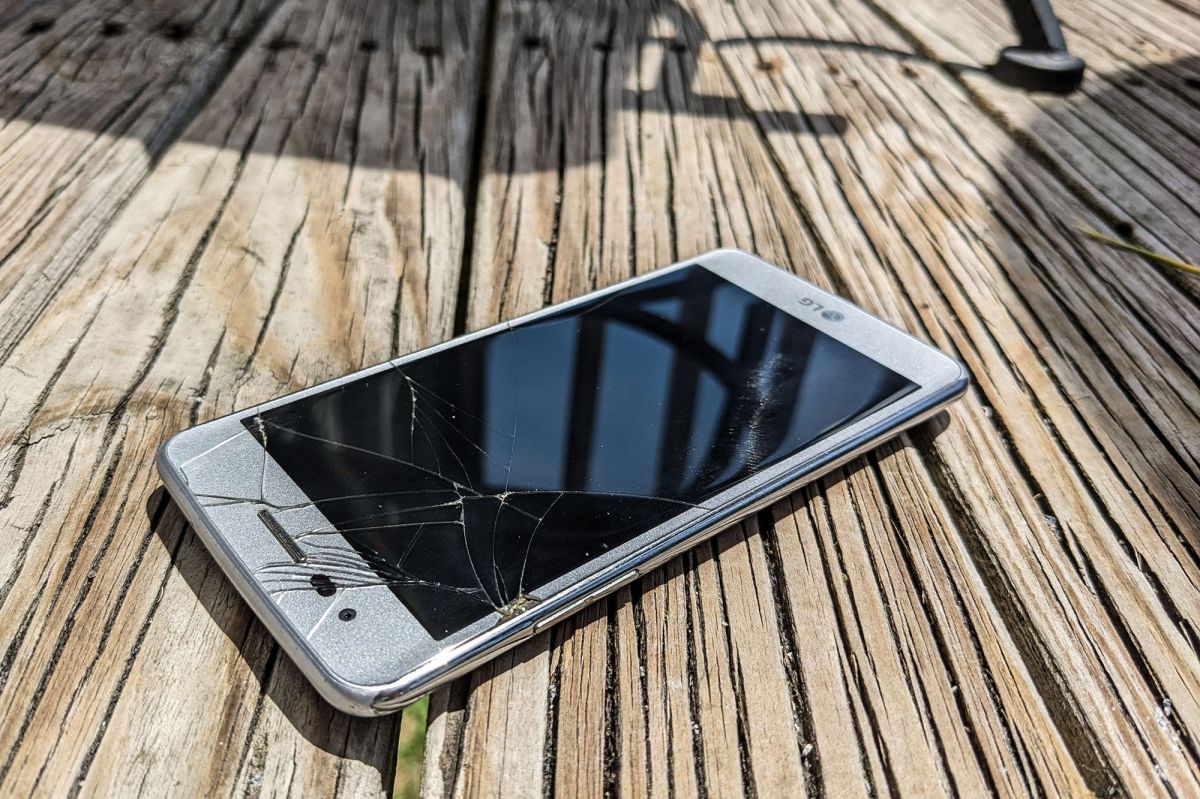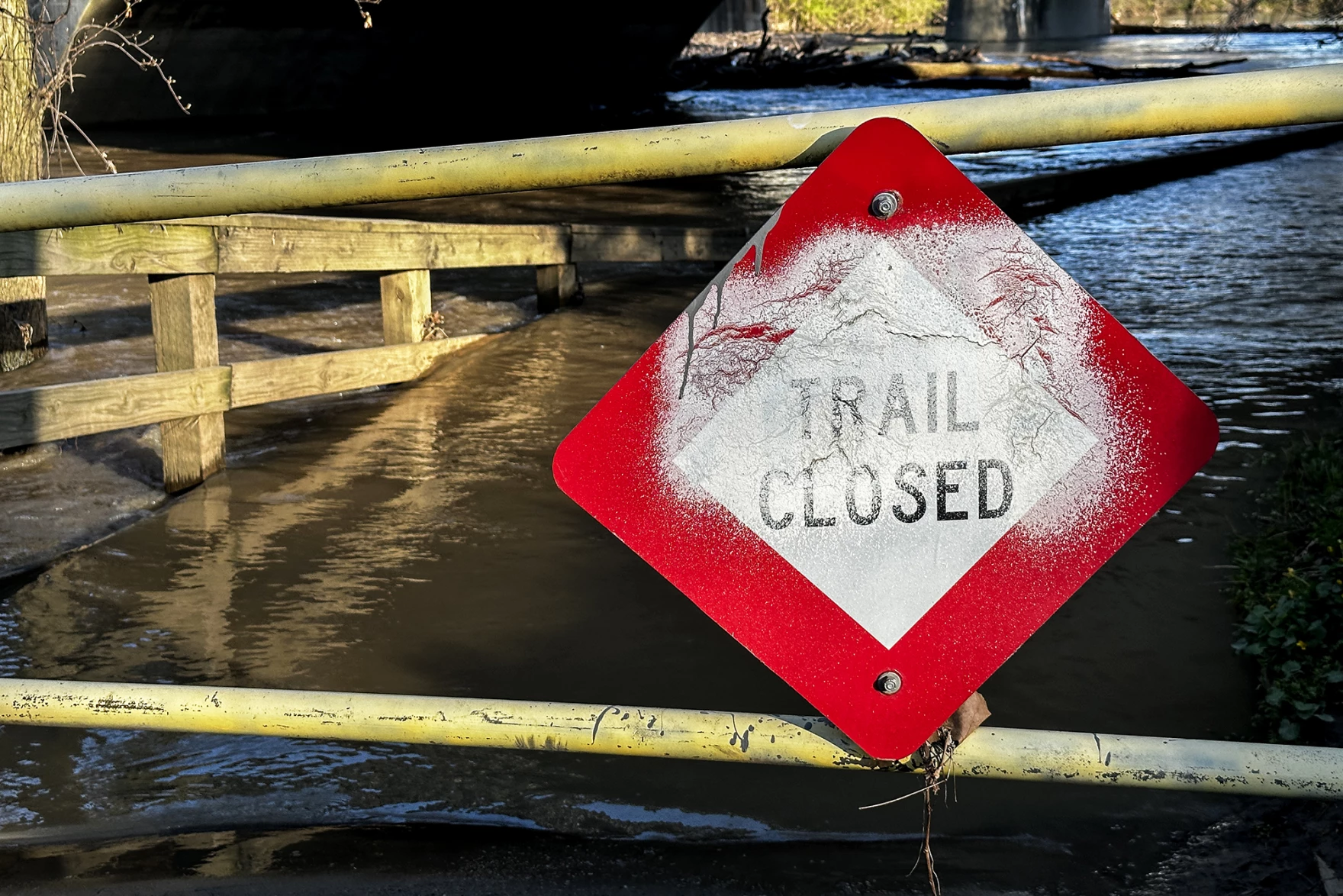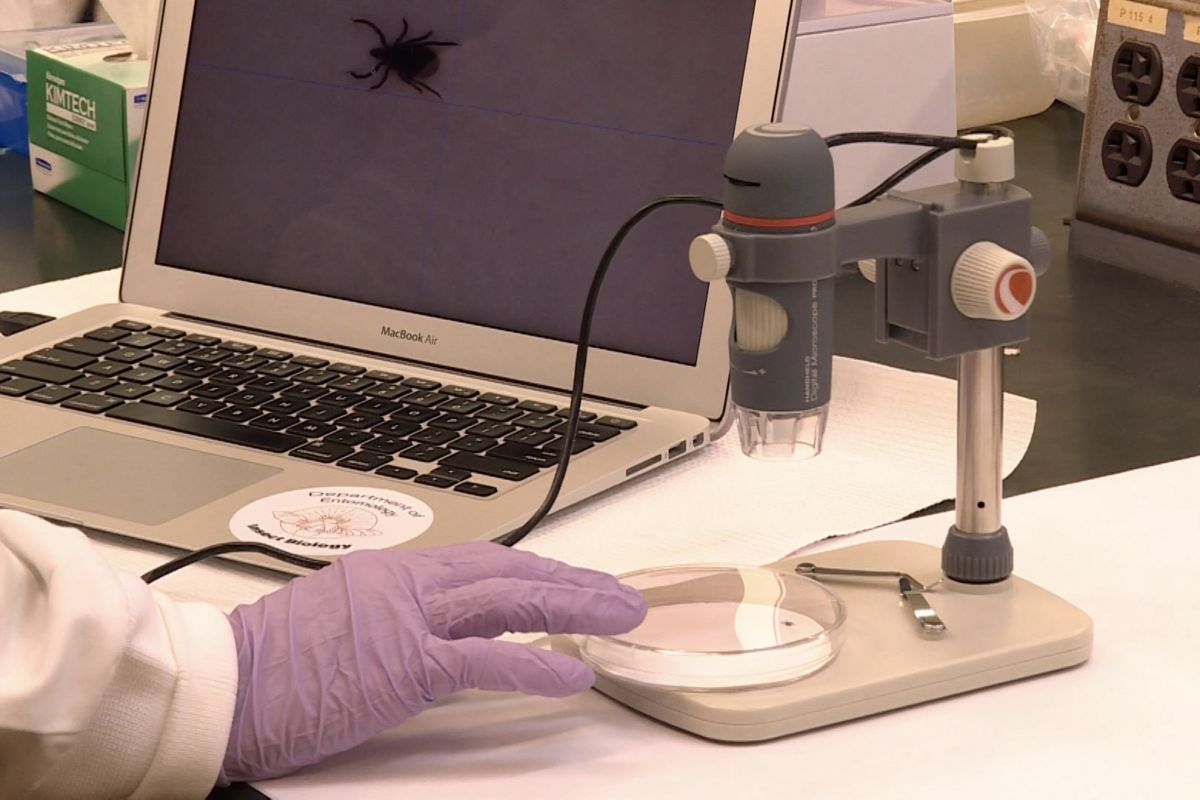You asked about climate questions and climate solutions. We've got answers.
Indiana Public Broadcasting News and its partner stations are gathering your questions on climate change and climate solutions. Share your questions on the topic, especially as it relates to our state through text or the question box at the bottom of this page. We will be answering some of the questions we receive throughout the year.
Here are some questions we have received and answered. We will continue to update this page as we dig into more questions we receive.
From a person in Newburgh:
Why do some people think that climate change isn't happening?

FILE PHOTO: Steve Burns/WTIU
Nathaniel Geiger is an assistant professor at Indiana University and researches climate engagement.
He said it's important to know the majority of Hoosiers believe in climate change. Only about 20 to 25 percent think climate change isn't happening at all or are just unsure.
Geiger said some people reject scientific findings that they can’t see for themselves. People who believe the Earth is flat, for example, usually don't have the opportunity to go into space and view the Earth itself.
"Similarly, climate change is complex enough — the phenomenon is complex enough that when we experience warmer or cooler temperatures, it's hard to know what to make of those," Geiger said.
From a person in Evansville:
Does recycling plastic help with climate change?
The answer is yes — if you’re doing it right.
Just about anything you buy new takes materials, energy and fuel to make, build and ship — which leads to more greenhouse gas emissions. Plastic is no different.
Allyson Mitchell is the executive director of Circular Indiana. She said reducing, reusing and recycling means less new plastic needs to be made from fossil fuels — and that’s good for the climate.
“So anytime you can use — extend the life of a material and a product, whether that's through reuse or recycling, you are going to have a positive impact or a reduction in the total impacts,” Mitchell said.
But that’s only if you recycle correctly.
“Only plastic one and two in the form of a bottle and jug is recyclable,” Mitchell said.
From a person in Zionsville:
The answer:
Yes, Indiana is looking into bringing in what are called "small modular nuclear reactors" into the state. In fact, Gov. Eric Holcomb recently signed a new law on this technology.
What is the progress of nuclear power in Indiana?

FILE PHOTO: Justin Hicks/IPB News
Indiana Michigan Power, one of the state's utilities, supplies some nuclear power from a plant across the Michigan border. However, there are no large-scale nuclear power plants in Indiana.
What is the progress of nuclear power in the state? One member of our audience was curious.
David Konisky is a professor at the O’Neill School of Public and Environmental Affairs at Indiana University. He said Indiana may not see large-scale nuclear power plants any time soon.
“It seems unlikely that utilities in this state are going to build very large nuclear power plants,” he said. “There's not a lot of that kind of stuff happening anywhere in the country.”
Where does nuclear waste go? An important question as Indiana welcomes small reactors

Michael Symonds/WMUK
Dry casks sit at the site of the Palisades Nuclear Generating Station in southwest Michigan. Indiana gets some of its energy from the D.C. Cook nuclear plant just a few miles south of Palisades.
Indiana lawmakers are paving the way for smaller nuclear power plants to come into the state. A member of our audience wanted to know: Where does nuclear waste go? Right now, not very far at all.
At most nuclear power plants today, the waste — also called spent fuel — stays on the property where it was created.
"When fuel is removed from a reactor in a commercial nuclear power plant, it is hot in two ways," said David McIntyre, spokesperson for the U.S. Nuclear Regulatory Commission. "One, the temperature is very high. It is very hot — as we experience heat — and two, it's hot in the colloquial sense that it is very radioactive"
From a person in Elkhart:
What energy, environment bills are on their way to becoming law?

Courtesy of the Hoosier Environmental Council
Zach Schalk of Solar United Neighbors speaks at the 2022 Renewable Energy Day at the Indiana Statehouse. One of the bills the group supported — which allows homeowners with HOAs better access to rooftop solar — became a law.
There were several bills proposed this year's legislative session that had to do with energy and the environment in Indiana. Here's a run-down of which bills passed and failed during this year's legislative session.
It covers nearly a dozen bills that have now been signed into law and 10 bills that died during the legislative session.
From a person in Fishers:
With so much support, who wants to phase out rooftop solar incentives? Answer: Indiana utilities
Indiana utilities have more influence on politics in the state than you might imagine. Net metering is a good example.
It's the credits people with solar panels on their roof get for delivering extra energy back to the grid. A lot of people like it. It makes solar more affordable. But those credits are getting phased down this year. The fact that utilities don't like it could be the reason.
But rooftop solar is something a lot of people support. Environmentalists like it. It gives rural residents energy independence. It helps businesses meet their climate goals. It creates jobs. It’s also slowly become something both Democrats and Republicans can agree on.
The law to phase out higher net metering rates passed in 2017. Since then, lawmakers have proposed at least seven bills to overturn or change it. Half of them got bipartisan support.
From a person in Elkhart:
Are there more trees in Indiana than there were a decade ago?
Devan Ridgway/WTIU
Not much has changed in the past decade — but the answer is still a little surprising. According to the U.S. Forest Service, from 2006 to 2019 the number of forest acres in Indiana went up slightly by 2 percent. But the number of individual trees went down by 6 percent.
John Seifert directs the Indiana Department of Natural Resources’ division of forestry. He said the reason is that Indiana’s forests are aging.
“And as trees get bigger, they shade out other trees, it's just sort of the survival of the strongest, so to speak," Seifert said.
From a person in Muncie:
Can we address climate change without addressing consumerism?

Lauren Chapman/IPB News
It’s no secret that the less stuff you buy, the less energy and materials are needed to make that new product — and that’s good for the climate. There are other kinds of consumption too — like how much electricity we use in our homes or how much gas we use to fuel our cars.
Amrou Awaysheh is the executive director of the Indiana University Business Sustainability and Innovation Lab. He said many businesses have set aggressive goals to lower their carbon emissions and more companies are making consumers aware of what they're doing for the climate.
That means consumers can make a positive impact by "voting with their dollars."
"If they choose to buy products and goods from a company that doesn't care about the environment, or doesn't care where the raw materials are extracted from — then that's on them," Awaysheh said.
What do I do if there are PFAS in my water?

Lauren Chapman/IPB News
The Indiana Department of Environmental Management is testing public drinking water utilities for PFAS.
PFAS are a group of human-made chemicals found in all kinds of non-stick and stain-resistant products — from pans, to carpets to fast-food wrappers.
Among other things, exposure to them has been linked to kidney cancer, problems with the immune system and developmental issues in children.
So far, IDEM has found unhealthy levels of PFAS in 19 drinking water utilities — 10 midsize utilities and nine small water utilities. Some listeners who get their water from these utilities wanted to know how they can protect themselves and their families.
From a person in New Castle:
Therapy aims to tackle climate distress, but there may not be enough in Indiana

Alan Mbathi/IPB News
There’s only so much time for countries around the world to drastically cut greenhouse gas emissions that contribute to climate change. Here in Indiana, we’re already seeing things like more extreme heat, flooding and severe storms.
The problem is so big that it can make people feel helpless trying to fight it on their own.
A new type of therapy aims to help people turn their fears into action. It’s called climate-aware therapy — and it’s so new that there’s only one person we know of who offers it in Indiana.
Question:
The answer:
The cities of Clarksville and Richmond are working on heat management plans. Indiana University’s Environmental Resilience Institute also keeps a list of all kinds of climate adaptation strategies that cities are working on in the Midwest here — including cities in Indiana.
From a person in Point Idalawn:
The answer:
Arguably Indiana lawmakers are taking that into consideration. Through the pilot program, created in a 2021 bill, CenterPoint is the only utility allowed to securitize its assets and only for its A.B. Brown coal plant.
From a person in Zionsville:
Why does Indiana impose a fee on electric car owners?

Pixabay
Indiana will have a lot more places for electric vehicles to charge up in the coming years — both from federal efforts like the National Electric Vehicle Infrastructure program and the state's settlement with Volkswagen. Advocates hope this will encourage more Hoosiers to buy electric cars.
But if that's the goal, then why does Indiana impose a special fee on electric car owners?
The answer has to do with the way Indiana funds its roads — mainly through gasoline taxes. Because electric vehicles don’t use gas, Indiana imposes an annual registration fee on electric car owners. Starting in July, that fee will be more than $200.
From people in Kokomo and Indianapolis:
How did Indiana come up with the fee to register electric vehicles?
Rep. Jim Pressel (R-Rolling Prairie), who helped set the fee in this past legislative session, explains the formula works like this:
Lawmakers looked at the average miles driven per year nationally divided by the average miles per gallon for a car built in 2022. Then, they multiplied that number by about 43 cents — the total excise and sales tax on gasoline in 2020.
That comes to roughly $214 — the registration fee electric vehicle owners have to pay every year. EV owners don’t have to pay federal gas taxes.
“The road has no idea who's driving on. It doesn't really care. It just knows that it needs to be repaired, maintained, and that that has to come from somewhere," Pressel said.
How do I protect myself from wildfire smoke?

Tony Sandleben/WBOI
Smoke from wildfires in Canada covered Fort Wayne and many other areas of the state in late June. Those fires continue to affect the air quality in Indiana.
Many experts say it's best to stay inside if possible and wear an approved N95 mask if you have to be outside. However, poor air can still seep into homes and businesses.
Sarah Commodore is an assistant professor in the Department of Environmental and Occupational Health at Indiana University’s School of Public Health.
“However way you can keep your home closed off to the outside world for now, until the smoke goes down or until the smoke goes away — you want to do that," she said.
That means shutting windows and doors, and not running things like exhaust fans — which can bring in air from outside. Commodore said the same idea can be applied to your car — so you should close windows and recirculate the air.
From a person in Indianapolis:
Earth-friendly native plants aren't always a welcome sight – some cities, HOAs aim to change that
Native plants aren’t just good for birds and bees. They also make the land more resilient to the effects of climate change and can even help prevent it. But cities and homeowner’s associations don’t always like the way they look — putting them at odds with residents who want to grow native plants in their yards.
Some cities and HOAs in Indiana are working with these homeowners to encourage these plants.
Bloomington changed its ordinance to define a weed as an invasive plant — a plant that can spread out of control and prevent other plants from growing. And homeowners in Bloomington can plant almost anything they want in their yards as long as it’s not invasive and doesn’t block traffic sight lines or sidewalks.
Indianapolis encourages residents to plant natives — but it does it a little differently. You can get your native plant garden certified by the city through its Native Planting Area Program to make sure you don’t get fined.
St. Joseph County updated its ordinance to specify that things like native plant gardens, rain gardens, food crops, buffer strips and wetland vegetation aren’t to be considered weeds.
Aside from government ordinances and programs, anyone in the state can apply for a certification through the Indiana Native Plant Society and purchase a sign.
But even if your local government allows it, your homeowner’s association might not.
Which Indiana communities are most vulnerable to climate change?

Abigail Ruhman/IPB News
Indiana University's Gabriel Filippelli said communities in low-lying areas may struggle with flooding and remain more vulnerable to climate change.
Which Indiana communities are most vulnerable to climate change? One member of our audience was curious.
Gabriel Filippelli is the executive director of the Indiana University Environmental Resilience Institute. He said communities in low-lying areas may struggle with flooding and remain more vulnerable to climate change.
“Some of those communities are the ones who sort of live in low-lying areas, usually lower-value properties,” he said. “So again, it tends to be the lower income communities are the most vulnerable.”
Filippelli said urban areas in the state also tend to be more sensitive to heat and effects of climate change.
How can policymakers, property owners keep heating and cooling systems energy efficient?

Pixabay
O'Neill School of Public and Environmental Affairs at Indiana University's David Konisky said one of the best ways to efficiently use energy is to invest in a new, more efficient system.
What can property owners and legislators do to ensure energy efficiency for heating and cooling systems as the state deals with higher temperatures? One member of our audience inspired this question.
David Konisky is a professor at the O’Neill School of Public and Environmental Affairs at Indiana University. He said homeowners and landlords who want to keep their current energy systems should continue to properly maintain them.
“Maintaining those systems is kind of the easiest way to be sure that they are operating as efficiently as possible,” he said.
Konisky said one of the best ways to efficiently use energy is to invest in a new, more efficient system.
Is there an outbreak of Lyme disease this year? No, but tick diseases are on the rise

Rebecca Thiele/IPB News
Purdue University postdoctoral researcher Maria Murgia makes a deer tick easier to see by connecting the microscope to a laptop computer. Deer ticks, also known as blacklegged ticks, can carry Lyme disease.
Is there an outbreak of Lyme disease in Indiana this year? An audience member wanted to know.
Lee Green is the Indiana Department of Health’s senior medical entomologist. He said there hasn’t been a spike in tick illnesses this year, but overall they’ve been increasing over the past two decades.
Green said we’re seeing more ticks as their habitat and food sources grow. The blacklegged or deer tick, for example, is now found in every county of the state and can transmit Lyme disease.
“So those ticks like wooded areas and they seem to increase with deer populations," he said.

You can always join the conversation by signing up for the Indiana Two-Way. You'll receive a text to your phone every Thursday morning, with questions related to statewide topics and news updates to keep you informed.
Your answers will help guide our future reporting to make sure we are answering questions you and others around the state have. To join, text the word "Indiana" to 765-275-1120.